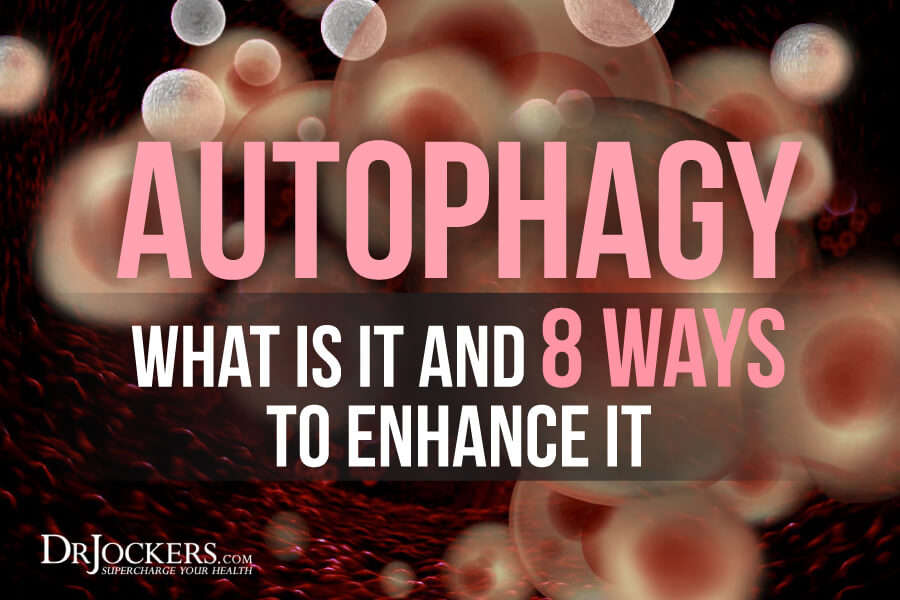 Autophagy: What is It and 8 Ways to Enhance It
Autophagy: What is It and 8 Ways to Enhance It
Two reasons why people fast are to lose fat and improve their mental clarity. In order to do either of those things, the body needs to reach a state of autophagy — your body’s natural method of detoxification. In this article, I am going to go over what autophagy is and how you can optimize it on a daily basis.
Autophagy happens when your body recycles and gets rid of old or excess cells (like visceral fat, scar tissue or senescent cells) and cellular proteins that don’t serve a purpose or benefit your health. The major drivers of autophagy are cellular stressors such as nutrient deprivation brought on from various mechanisms including fasting, exercise, and significant temperature change.
The Nobel Prize in 2016 was awarded to the Japanese researcher Yoshinori Ohsumi for his breakthrough work in helping us understand the process of autophagy and how it works. In this article, you will discover why autophagy is such an important concept and how to structure your life to optimize its benefits in your life.
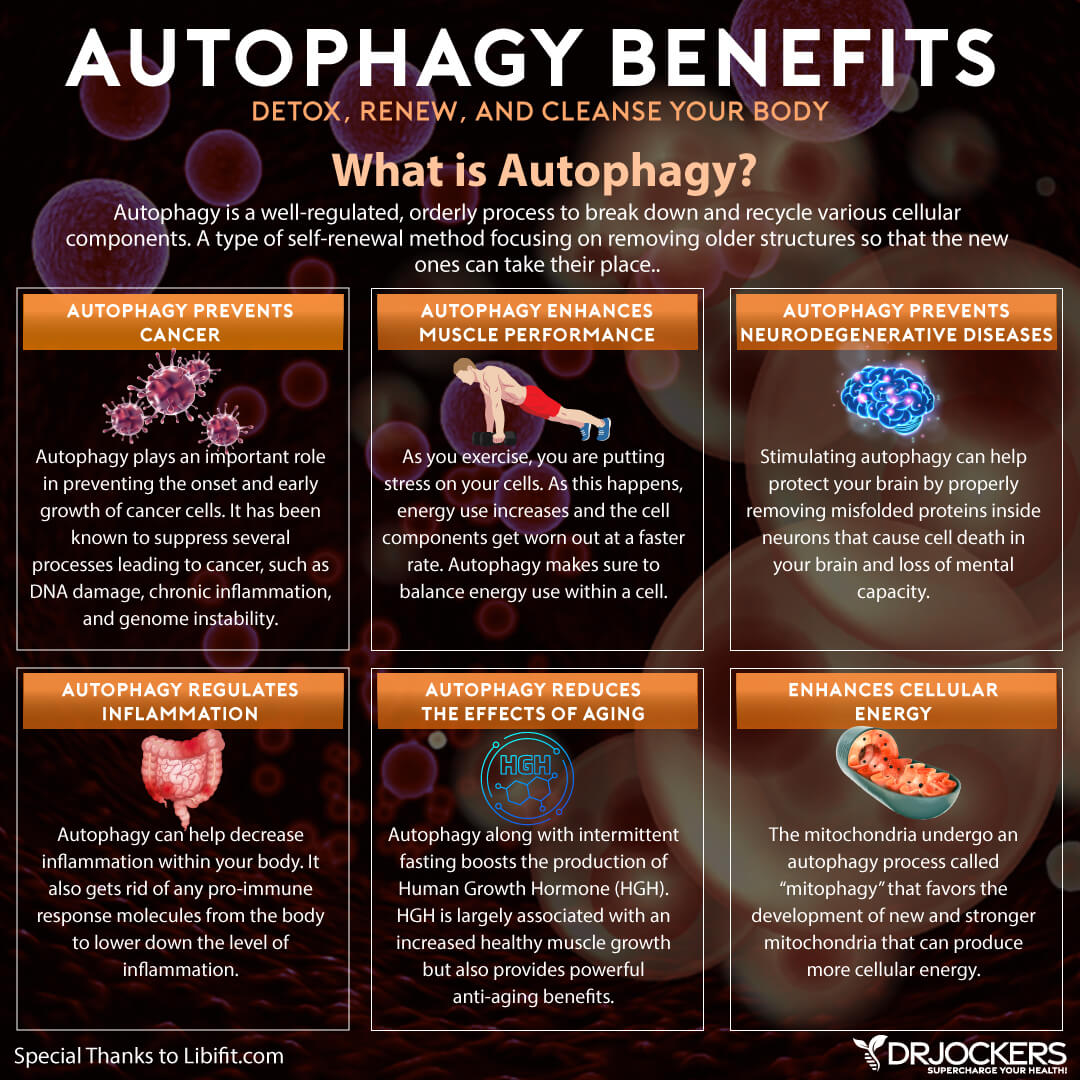
The Fasting Transformation Book
If you want to improve your metabolic health and burn fat, improve your brain and overall energy levels…intermittent and extended fasting are incredibly powerful strategies.
That is why I want to introduce you to my best-selling book, The Fasting Transformation. It goes into the most recent scientific research and strategies for implementing intermittent and extended fasting into your life.
This book is the best book on fasting the world has ever seen and I have read them all! It is now, my great honor to present this to you and I am deeply appreciative of your support!
How Does Autophagy Happen:
The word Autophagy is derived from the Greek “Auto – Phagein” meaning “self-eating.” This is a form of cellular recycling where the cell itself will metabolize various components in order to reuse those components to build new and healthier cellular structures.
Within each cell there are a number of essential components called “organelles,” much like the various organs that make up our body. The way autophagy works is when the cell is exposed to stressors such as nutrient deprivation, it creates a transient double membrane structure called a phagophore. The phagophore expands and has a tremendous level of flexibility in regard to its ability to surround and sequester cellular components such as proteins, lipids and whole organelles (1).
Once it surrounds and encloses the components it is after, it delivers them to the lysosomes. The lysosomes are unique organelles that contain degrading enzymes to degrade the particular components they are released upon.

The major driver of autophagy is cellular stress. Stress refers to an environment that demands change. Our body is constantly looking for a level of physiological balance called homeostasis which is necessary for survival.
During times of nutrient deprivation (such as fasting, exercise, etc.) the body needs to load up on raw materials to fuel the metabolic machinery to produce the necessary energy for survival. To do this, the innate intelligence within our body signals to break down the older cells and cellular organelles that are working less efficiently to create newer cells that work to produce energy more efficiently (2).
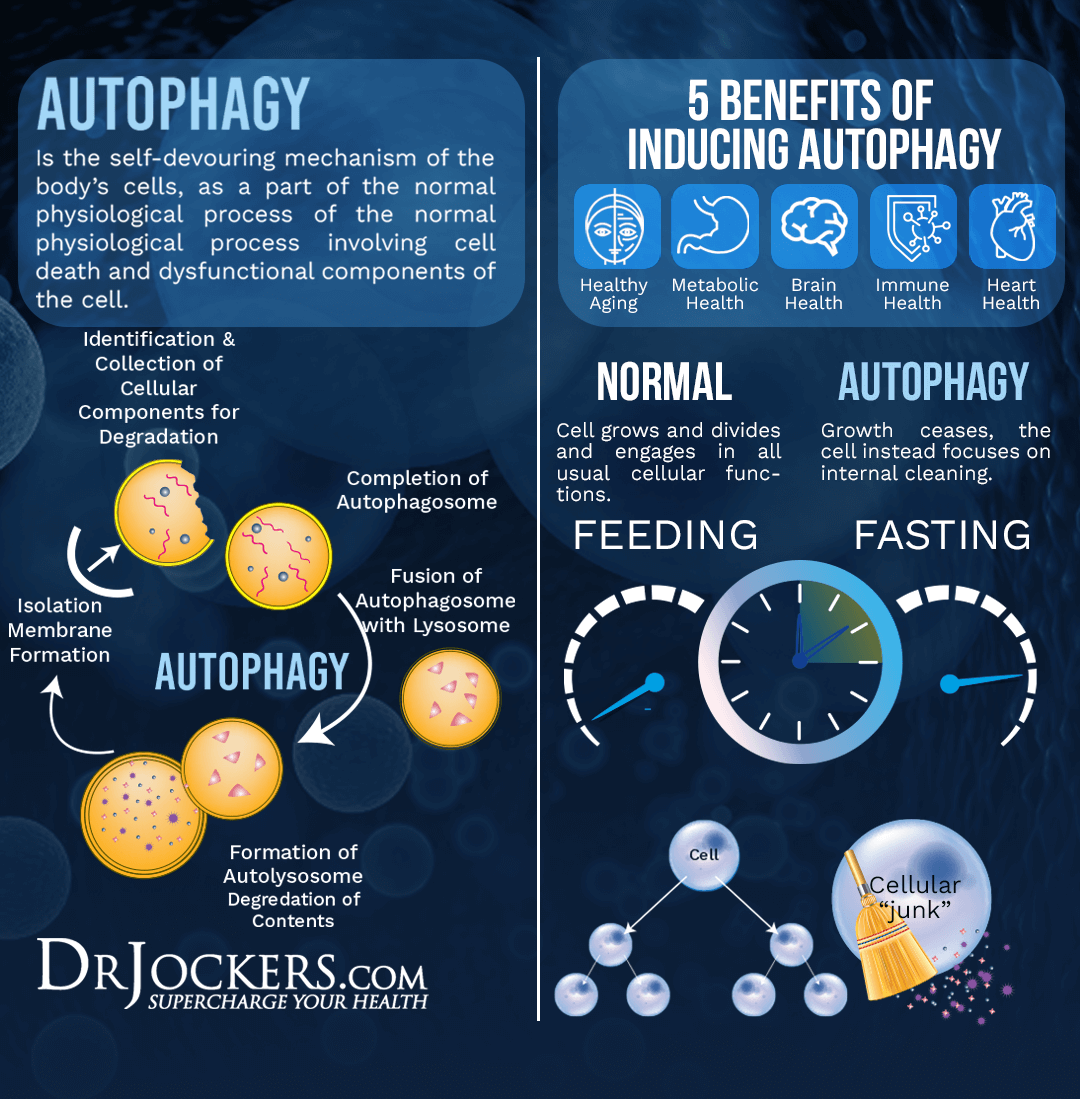
Benefits of Autophagy
It was very common for our ancestors to have stressful circumstances such as long periods of time without food, high intensity activity and excessive heat and cold. These demands stimulated a regular and healthy dose of autophagy within their cells.
The process of autophagy is occurring within all mammals at some level but creating a lifestyle that optimizes autophagy can be extremely beneficial for a number of reasons. Here are the top 5 reasons to support your body’s natural autophagy process.
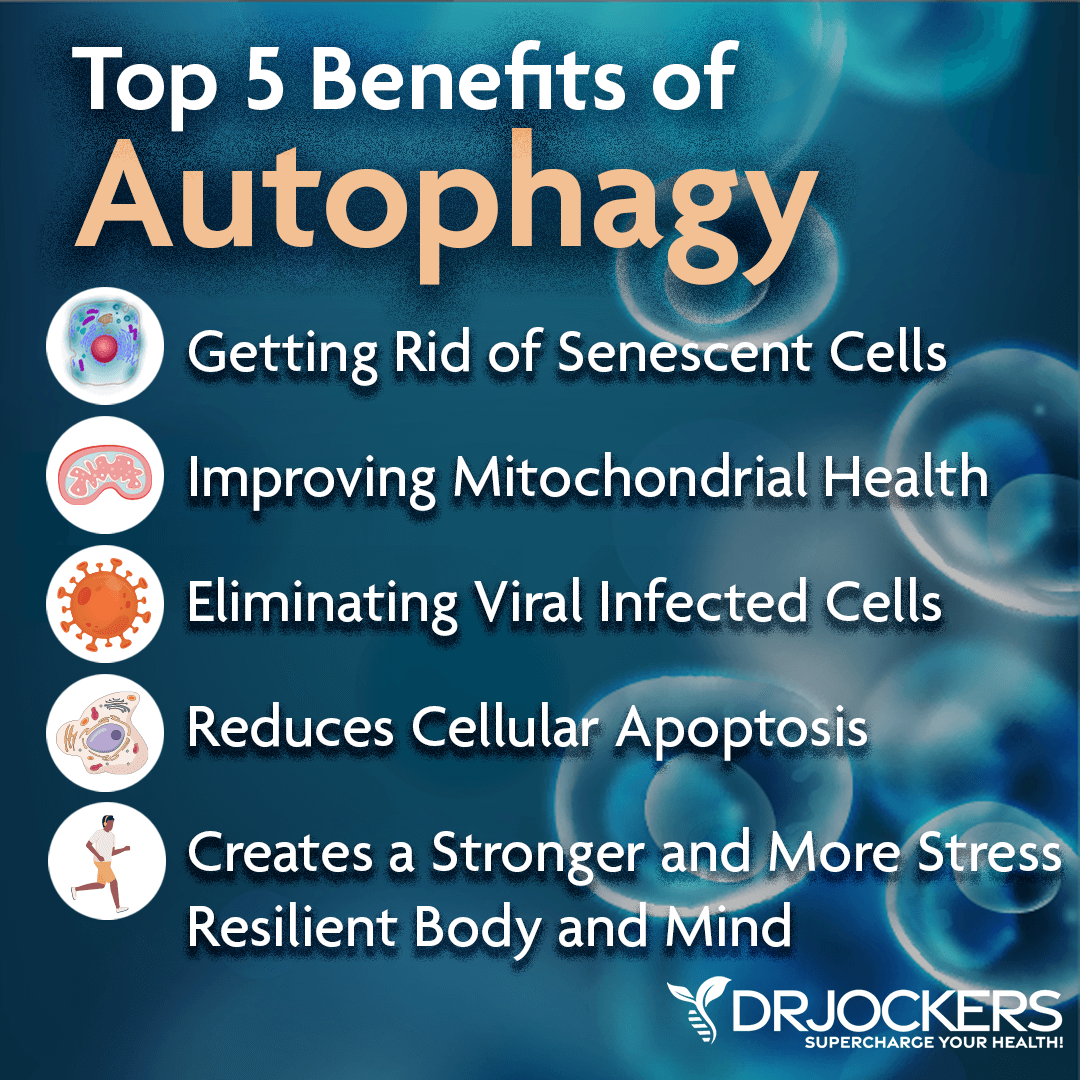
Getting Rid of Senescent Cells:
All cells have a certain lifespan and younger cells have dealt with less wear and tear and are more efficient in their particular functions. A senescent cell is an older cell that is not functioning at a high level. It is still working, but at a much lower level of efficiency and not effectively enough to maintain the overall health of an organ or tissue of the body.
These cells are metabolically inflexible and have trouble using fatty acids for fuel. They rely on sugar/glucose metabolism and produce energy very inefficiently. They create a lot of metabolic waste and produce cell signaling factors that promote inflammatory conditions in the body.
These cells put the entire body at risk of the development of disease processes because of their dysfunction. While the development of senescent cells is a normal process, we should remove these as fast as we create them through autophagy (3). As people age, we develop more of these decaying cells. Therefore, the stimulation of autophagy is even more critical for the wellbeing of the individual.
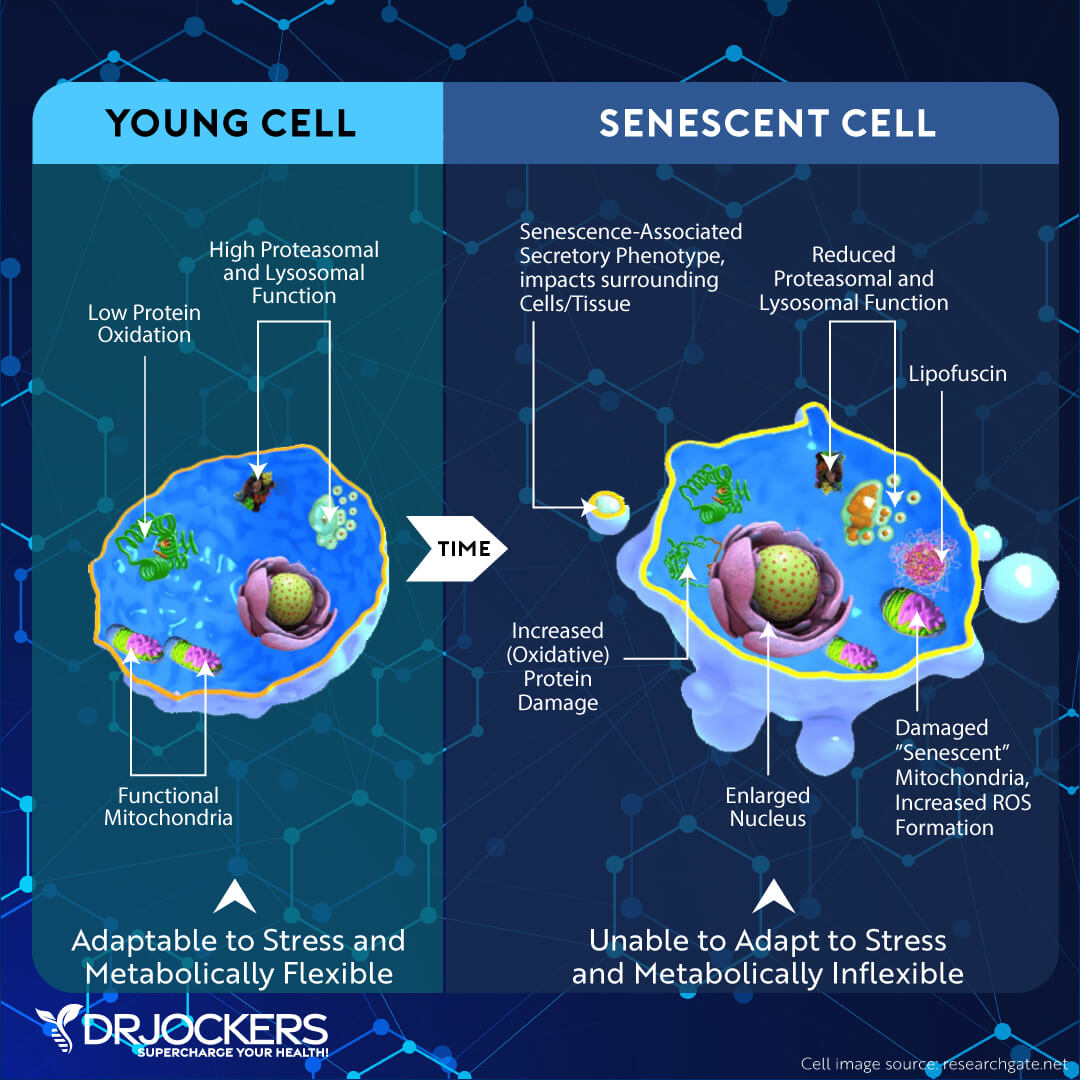
Improving Mitochondrial Health
Within a cell we have mitochondria which are unique organelles that produce cellular energy. A healthy mitochondria can use both glucose, fatty acids and ketones for fuel. When we train our body to create a large amount of energy from glucose, we end up producing a lot of free radicals and metabolic waste that damage the mitochondria.
Unless regular bouts of autophagy are stimulated, we end up with a large number of dysfunctional mitochondria that are metabolically inflexible and can only rely on glucose for fuel. Autophagy may keep the cell intact but degrade the dysfunctional mitochondria and reuse the raw materials to form new, metabolically flexible mitochondria. This process of mitochondrial recycling is called mitophagy (4).
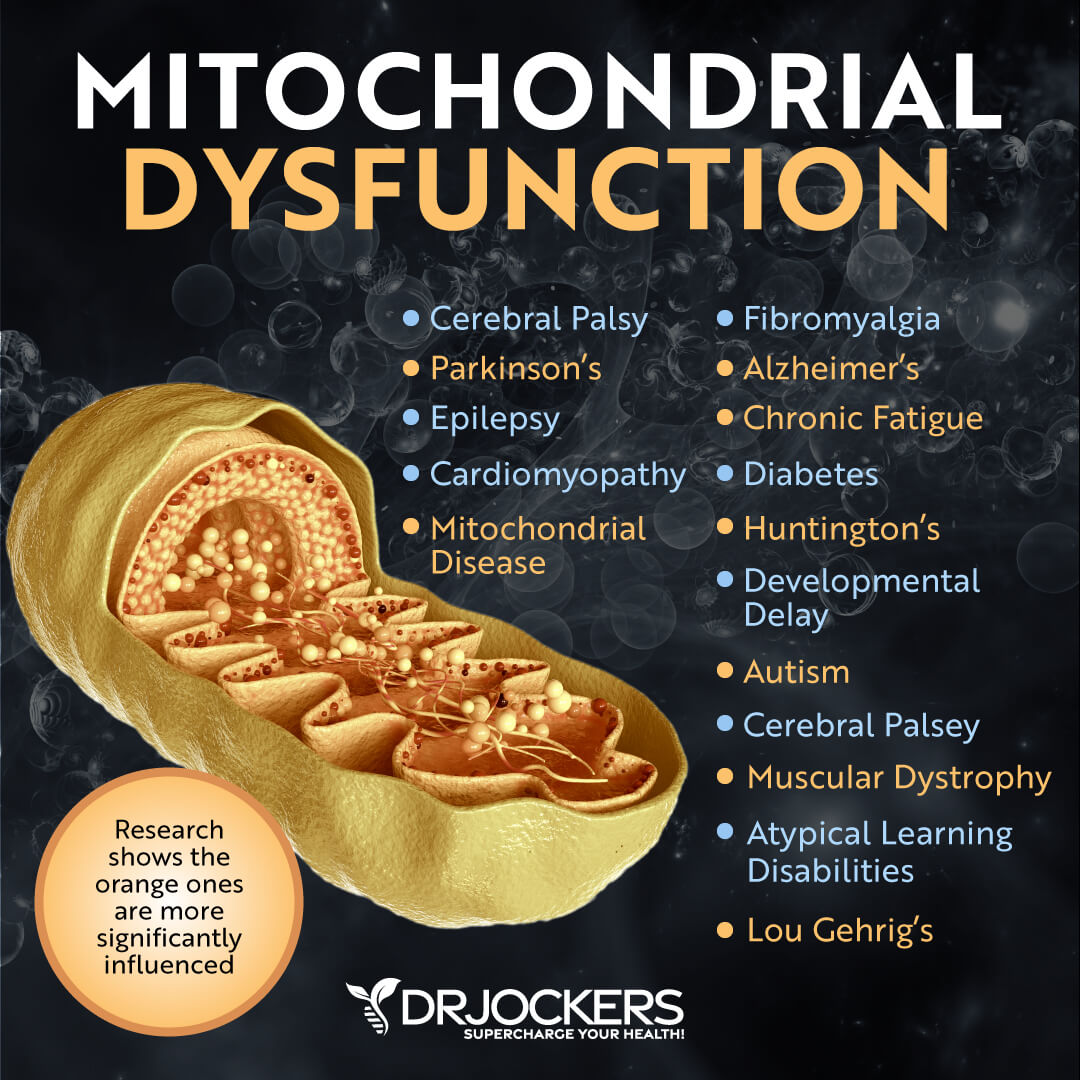
Eliminating Viral Infected Cells
Viruses are different than other pathogens in that they are intracellular as opposed to bacteria, yeast and parasites that live in tissues and organ systems of the body. Viruses get inside of cells and impact the metabolism and expression of the cellular genetics.
While a strong immune system helps to turn off viral expression and put them into a dormant state, it doesn’t actually get rid of these cells. The cells continue to replicate and continue to pass the viral material to new daughter cells. When the body is under more stress and the immune system is more susceptible, the viral activity can increase and cause wide range of cellular disruption.
A few examples would be the Varicella-Zoster virus which causes chicken pox in children and triggers Shingles in adults. The individuals who experience this harbor the virus from childhood and experience shingles outbreaks at times as an adult when they are under more stress and unable to adapt effectively.
Autophagy is the way the body naturally eliminates these infected cells and reduces viral activity in the body (5). In fact, when you experience viral challenges, such as getting the flu, you often lose your appetite and even water makes you feel nausea.
This is actually a way the body induces a fast (in some cases a dry fast if you cannot keep water down), stimulates autophagy and dramatically reduces the viral count in order for the body to adapt and get better. Following a fasting lifestyle is a great way to keep your viral infected cells at a low level and help your body maintain its optimal genetic expression.

Reduces Cellular Apoptosis:
Older cells will often undergo a programmed cell death called apoptosis. This process causes a lot of metabolic waste that can be stressful on the body and induce inflammation. Autophagy on the other hand is a very clean and energy efficient process (6).
The more cells that are able to repair themselves before they become permanently damaged, the less inflammation and metabolic waste is produced. This recycling process is very clean and smooth for the body and conserves energy for other vital functions and helps us to feel significantly better in our mind and body.
I think of the cellular apoptosis mechanism as a backup way the body eliminates diseased cells. If we are over-reliant on this back-up mechanism, then there are too many things that could go wrong.
As an example, high levels of oxidative stress block the p53 gene that governs cellular apoptosis. When this happens, we can no longer regulate cell division and overtime we develop various cancer (7).
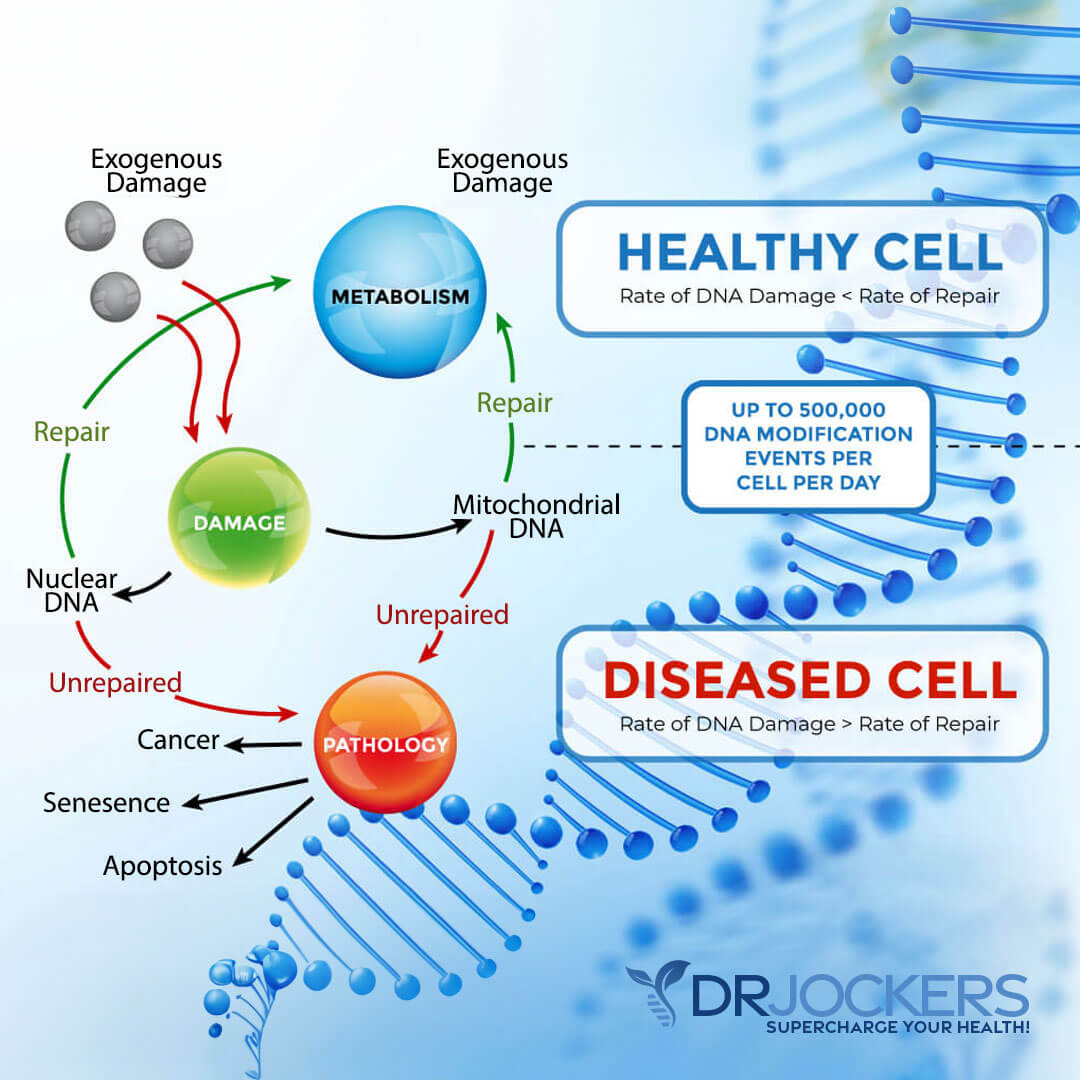
Autophagy Creates a Stronger and More Stress Resilient Body and Mind
All the above-mentioned benefits of autophagy work together to help us have a stronger and more stress resilient body and mind. For example, autophagy in our muscle cells makes them stronger and more resilient to wear and tear.
Autophagy in our intestinal lining makes us less susceptible to gut inflammation and the formation of leaky gut syndrome. High levels of regular autophagy on our skin makes it more resilient and less likely to develop eczema, acne and signs of aging.
Autophagy in our brain cells helps them function sharper and quicker which gives us better mood, memory and mental processing. It also dramatically reduces our risk of developing dementia and other neurodegenerative conditions (8).
As you can see, doing things to promote autophagy can be one of the most powerful health strategies you apply into your life. Here is how to maximize the balance between autophagy and growth signaling in your body.
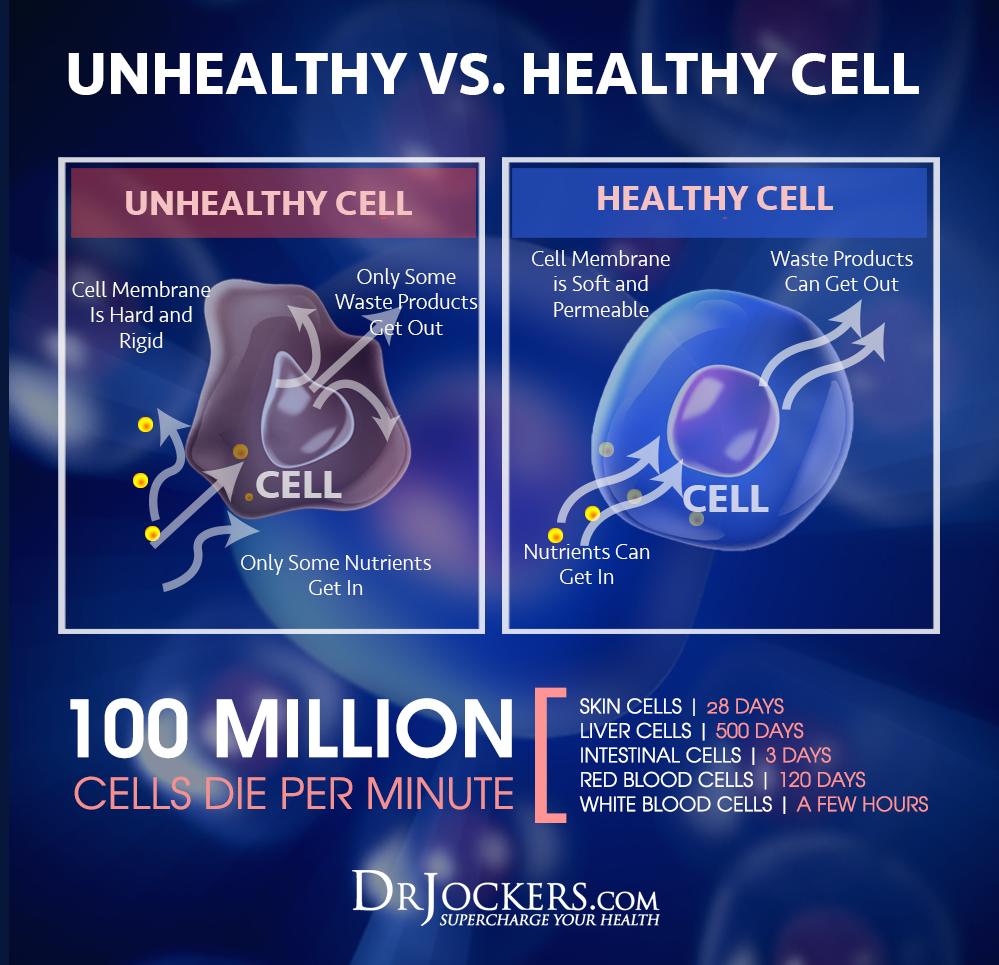
Intermittent and Extended Fasting
Fasting for extended periods of time is by far the most powerful way to stimulate autophagy mechanisms in the body. You will achieve peak levels of autophagy around Day 4 and 5 of a water fast when your glucose-ketone index (GKI) is around 1:1. If you want to learn more about doing a 5-day water fast and how to calculate the GKI, read this article.
Another approach is to do a partial fast for 5 days each month or two. One researched example of a partial fast is the Fasting Mimicking Diet, which has the individual consume between 800–1100 calories for 5 days and has powerful studies behind its impact on autophagy (9).
However, you can also stimulate a healthy level of autophagy through daily intermittent fasting where you restrict meals to an 8 hour or less window each day (10). This would mean you would fast for 16 hours without taking in any calories each day. As an example, you could eat your meals between 10am–6pm. If you want to learn more about intermittent fasting strategies than read this article.
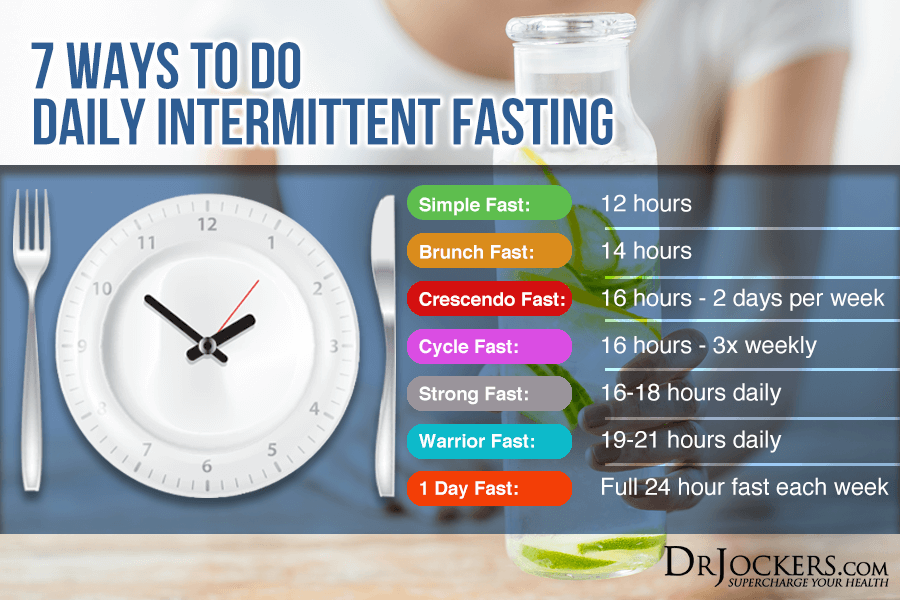
The Benefits of Feasting
Although fasting is the greatest stimulator of autophagy, we also need to stimulate the mTOR and insulin pathways in order to build and produce energy on a regular basis. Too much autophagy, as witnessed in individuals who are on a long-term calorie restricted diet leads to muscle wasting, depressed thyroid and sex hormone activity (10).
What is built into our DNA from ancestral times is a feast-famine cycle of eating. Our ancestors ate until they were full when they ate due to a lack of consistent food supply and a lack of refrigeration and other modern food storage strategies.
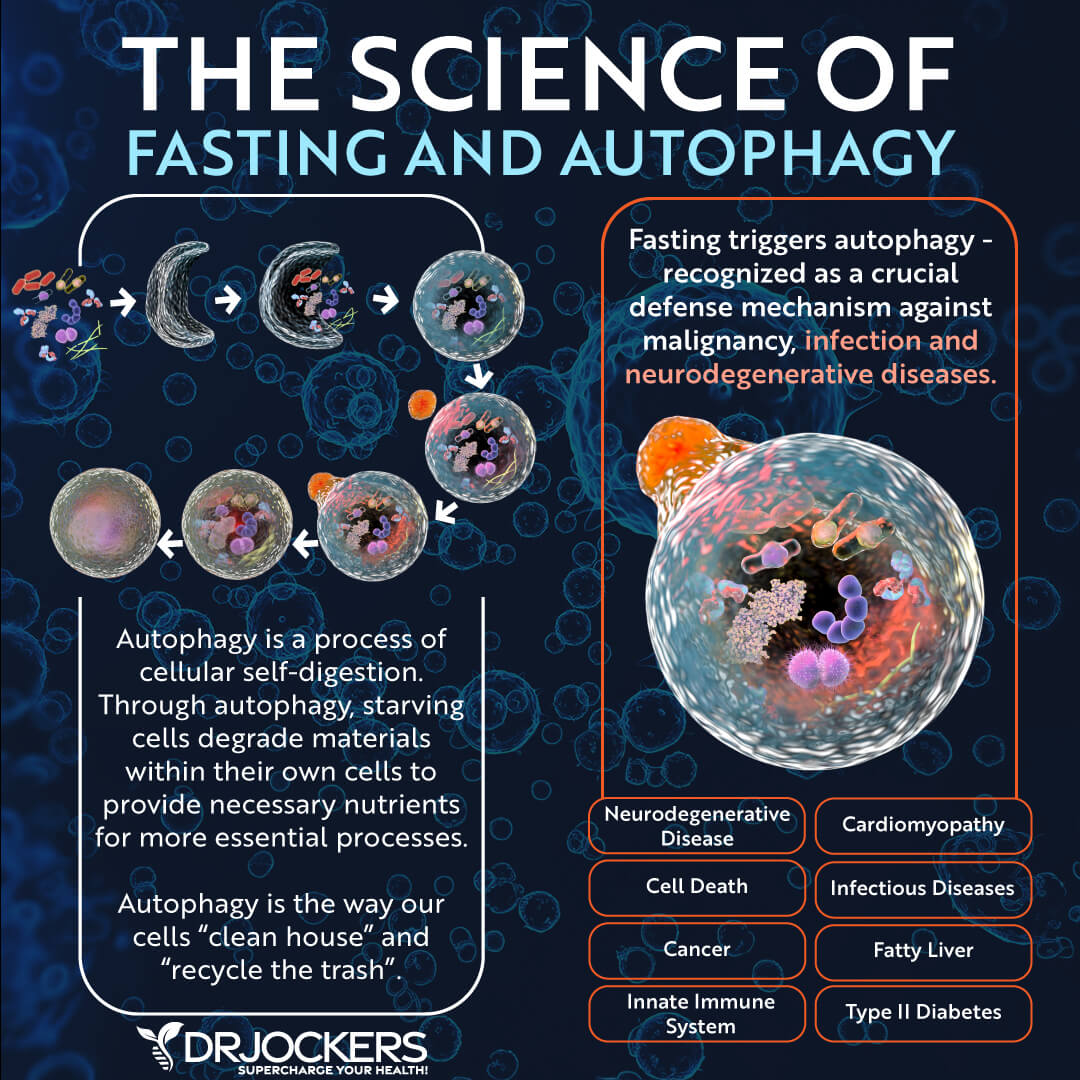
Food wasn’t guaranteed and they would frequently go days with little to nothing to eat. When they did have food available, the idea was to eat as much as you could so you could get your share as the food would spoil quickly.
When we periodically feast on healthy nutrient dense foods, we flood the body with key nutrients it needs, and we also stimulate metabolic pathways that help us to burn fat for fuel and have proper lean body tissue development.
The key principle to remember is that when we fast…we fast and when it is time to eat…we feast until we are full and satiated. This balances the body between the physiological mechanisms behind both building and cleansing the cells.
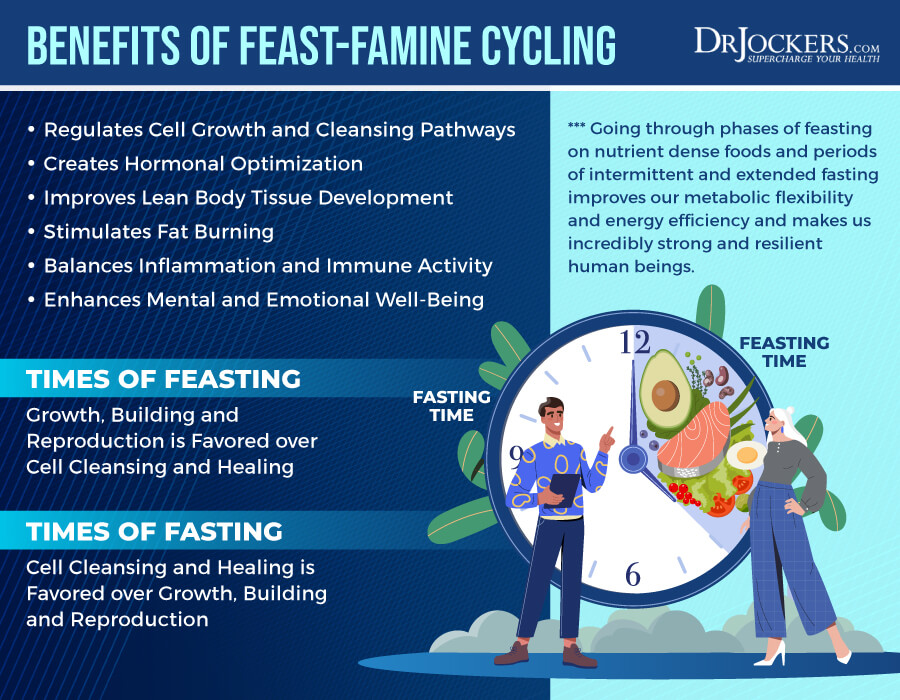
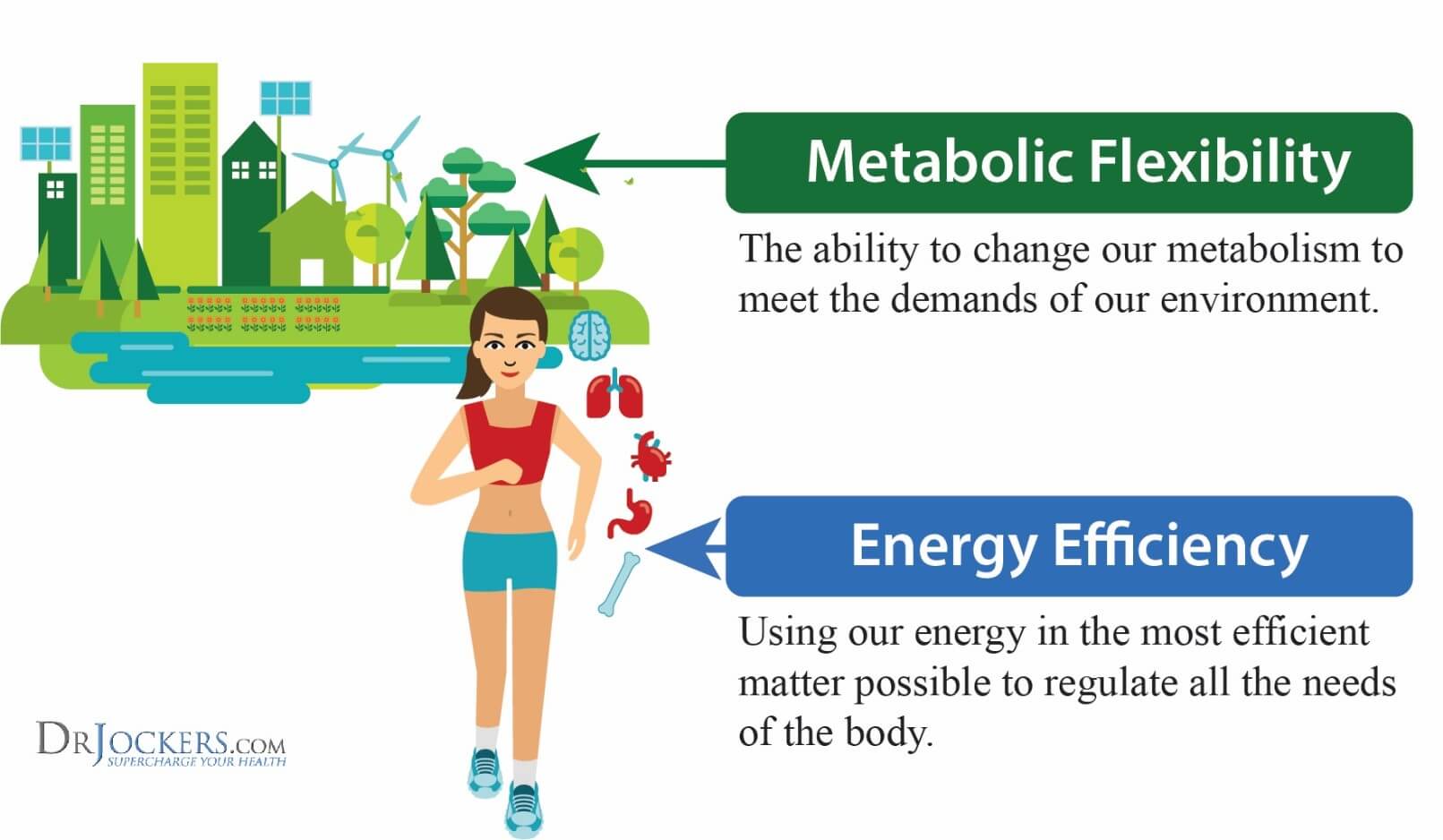 8 Ways to Enhance Autophagy in Your Body
8 Ways to Enhance Autophagy in Your Body
Fasting it by far the most powerful way to enhance autophagy in the body. However, there are a number of other strategies that help support the same genetic pathways that ramp up autophagy mechanisms.
In this section, I will briefly explain how these strategies will support your body’s ability to stabilize blood sugar, burn fat and improve autophagy and cellular repair.
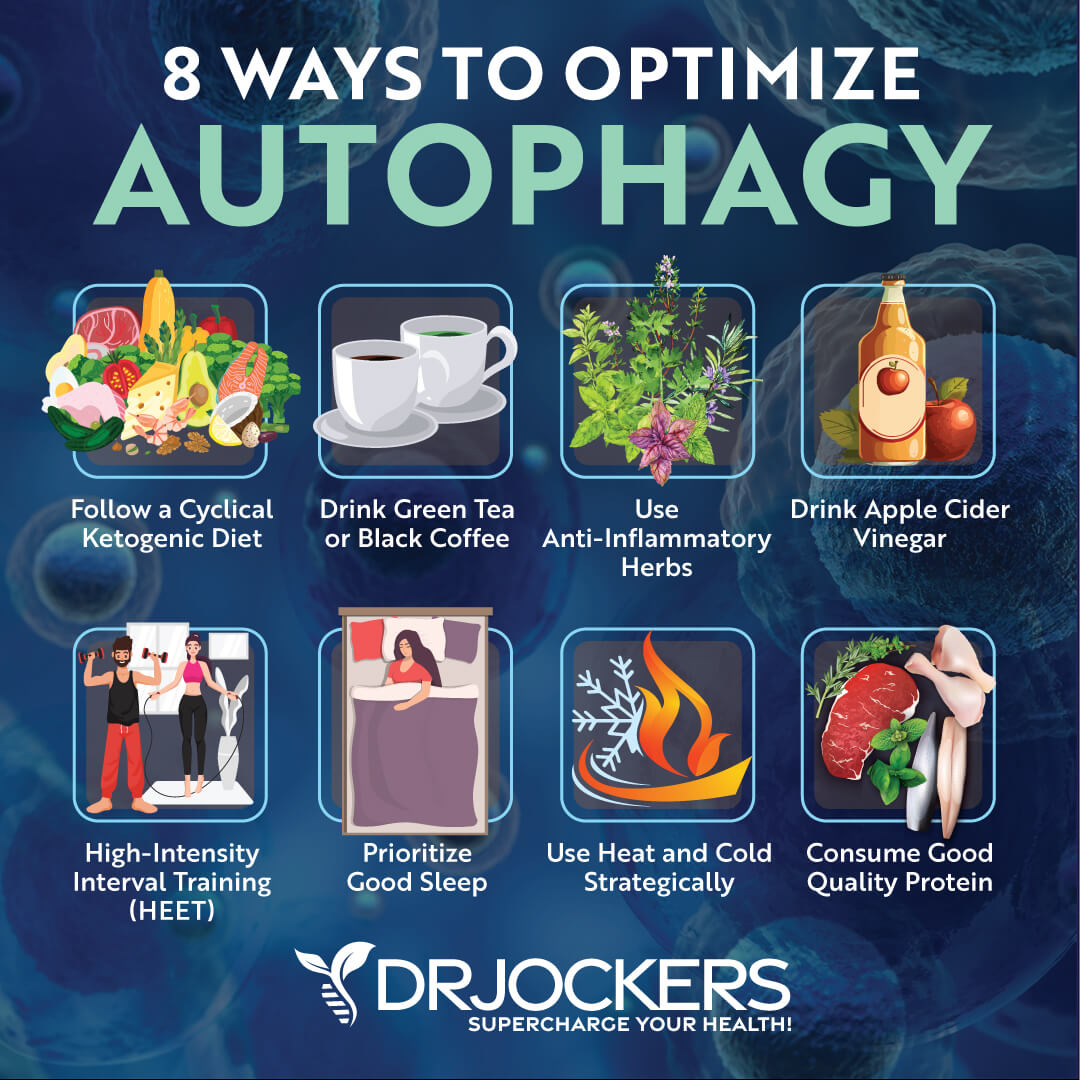
Follow a Ketogenic Diet
Most people in society are burning sugar in the form of glucose as their primary energy source. When we are in this sugar burning mode, we end up with large blood sugar fluctuations and higher insulin levels. This physiological process inhibits autophagy.
A ketogenic diet is a high fat, low carb and moderate protein nutrition plan. This pattern of eating lowers blood sugar and insulin levels and causes the body to adapt to burning dietary fat and its own body fat for fuel.
Ketones are byproducts of fatty acids that are more easily used to produce cellular energy and they can cross through the blood brain barrier to fuel the brain. Ketones are a preferred fuel for the body because they produce significantly more energy per molecule than glucose and they produce a lot less metabolic waste. They are a clean fuel source as opposed to the dirty fuel produced by burning sugar.
A ketogenic diet mimics fasting, and you get some of the same benefits of fasting while still eating food. By blunting insulin, the ketogenic diet primes autophagy pathways and when we apply intermittent fasting, we get into a state of autophagy much quicker than if we were not keto adapted. For more info on ketosis and the ketogenic diet, read this article.
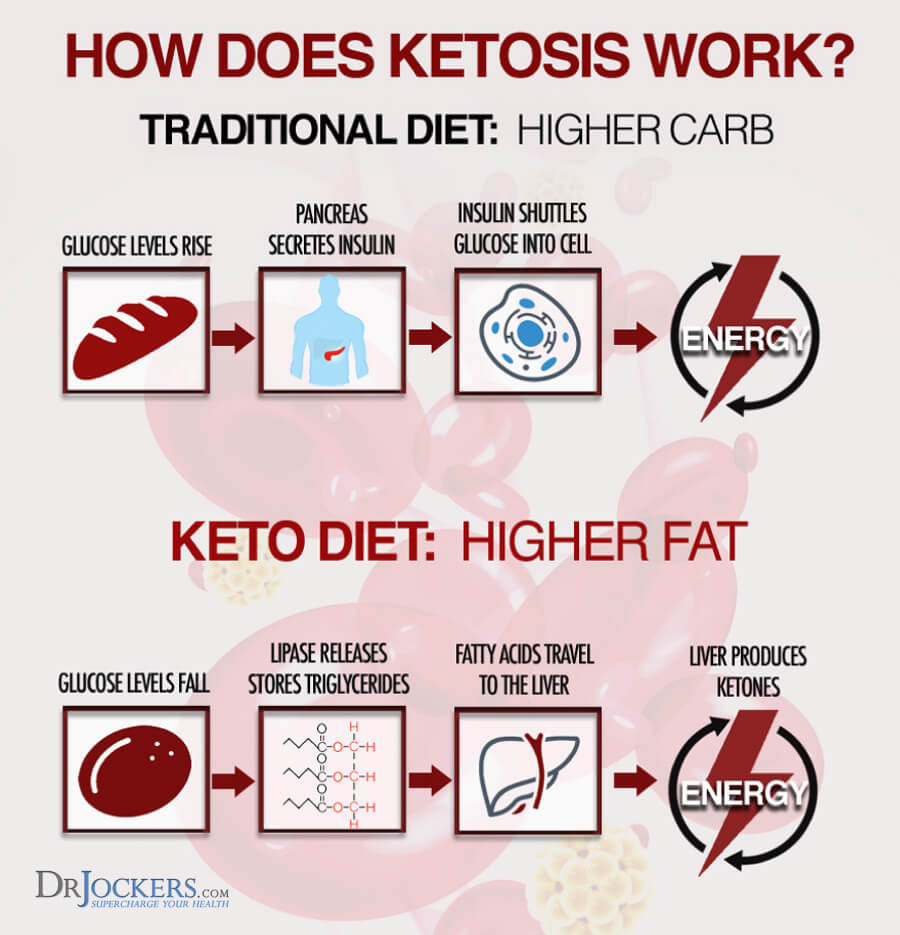
Drink Green Tea or Black Coffee
Green tea can help overcome a common weight loss roadblock: slow metabolism. For a lot of people, once they’ve lost a certain amount of weight, their metabolism slows down. With a slow metabolism, calories you consume are used more slowly and are more likely to be stored… and the rest of the fat you’d like to lose stays right where it is. The polyphenols in green tea, also known as catechins, counteract that slow metabolism by boosting your energy expenditure (11). Drinking enough green tea provides catechins needed to use more energy.
Green tea catechins also help to regulate ghrelin, otherwise known as the hunger hormone (12). If you struggle with fasting because of hunger pangs, green tea can reduce those pangs and help make your fast more successful.
In fact, a number of different plant polyphenols and nutrients have the power to make fasting a more pleasant experience. Mint and licorice root are known for their ability to reduce appetite. Ginger has anti-inflammatory benefits and can soothe your stomach, while citrus peel helps digestion and can even boost autophagy. To make it even simpler for you, Pique Tea has combined these plant ingredients into Dr Jason Fung-formulated fasting teas that will help your fasting experience be easier and more effective.
In addition, if you are a coffee drinker, then I have good news. Black coffee has been shown to help induce autophagy (13). My experience is that only about 66% of the population does well with coffee or caffeine in general and the other 3rd struggles with it. The way you know you are getting a positive response is if you feel good after the next few hours after drinking it on a fast. If you feel anxious, irritated, or have an increase in hunger and cravings than it is a sign you are having a poor response.
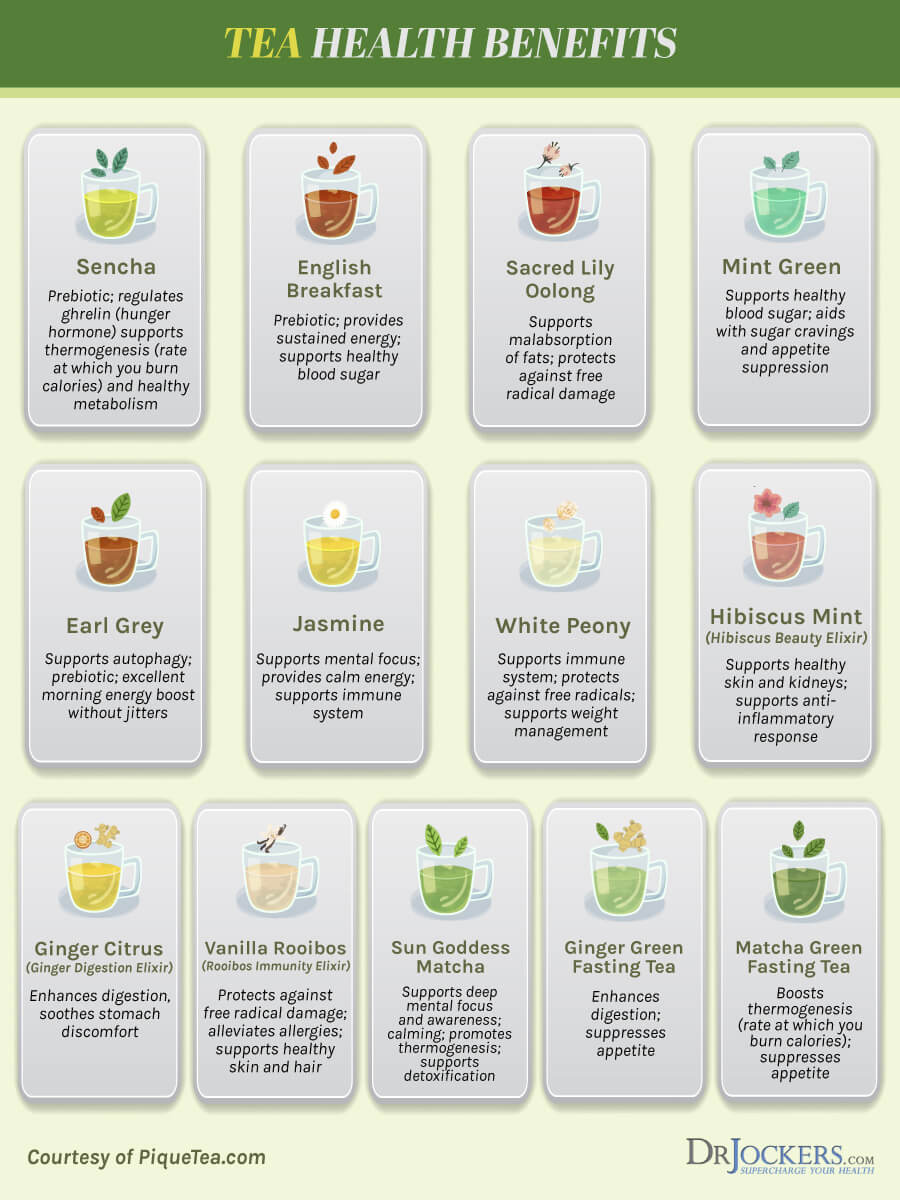
Use an Organic, Mycotoxin Free, Shade Grown Coffee
Low-quality conventional coffee is not great. Pesticides and mycotoxin in coffee can be harmful to your health. It is important that you drink high-quality, organic, mycotoxin-free, and shade-grown coffee for optimal benefits and safety.
I personally love and highly recommend Lifeboost Coffee. This coffee is organic, free from GMO, shade-grown, sun-dried, pesticide and chemical-free, full of antioxidants, stomach-friendly, less acidic than most coffee, and fairly traded with a 2-year shelf life. Most importantly, it is absolutely delicious.
Right now, they have a special holiday sale where you can this delicious, low-acid, immune boosting coffee for up to 50% off for a limited time.
Use Anti-Inflammatory Herbs
Just like green tea, many herbs contain unique plant compounds called polyphenols. These polyphenols act to suppress the mTOR pathway and activate the AMPk pathway to induce autophagy (14, 15).
This isn’t as strong a stimulus towards autophagy as fasting but it can be used in conjunction with fasting and the other strategies in this article to optimize the autophagy mechanisms in your body. Some of the best herbs for this include quercetin (red onions and elderberries), carnosic acid (oregano, sage and rosemary) citrus bergamot (Earl Gray tea), EGCG (green tea and dark chocolate), 6-shagaol (ginger), curcumin (turmeric) and resveratrol (blueberries, grapes and red wine) among others.
Getting these compounds by consuming a number of herbs in our diet and through supplementation can be very helpful. In addition, I am a huge fan of drinking herbal teas made from many of these compounds.
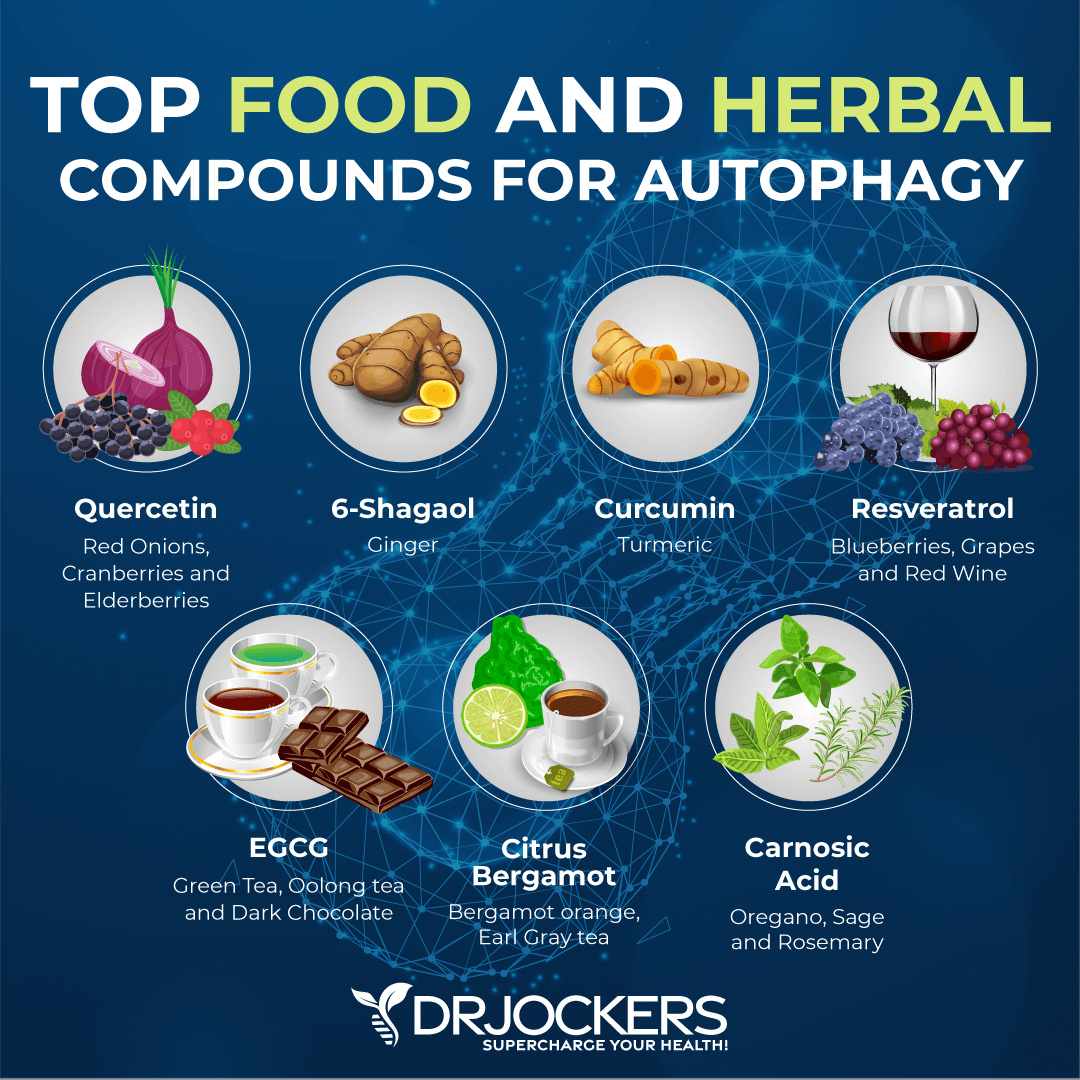
Drink Apple Cider Vinegar
You can also choose to drink an apple cider vinegar (ACV) tonic during your fasting window. ACV contains a compound called acetic acid, which helps boost your metabolism and burn fat rather than store it (16).
Apple cider vinegar is also shown to be useful in making you feel fuller for longer and reducing your appetite. When paired with starchy foods, ACV can slow digestion. While digestion is happening, you remain feeling full. While your body is digesting that food, your insulin levels should remain stable, meaning you won’t feel tempted to reach for a sugary snack.
We recommend diluting 1–2 tablespoons of ACV in water and drinking it before meals.

Do High-Intensity Interval Training (HIIT) and Resistance Training
Or any high-intensity workout, for that matter. High intensity interval training and resistance training while fasting can ramp up autophagy, stimulate fat burning and improve mood and mental focus. Fasting and exercise both create an environment of stress for the body. That might not sound very appealing in theory, but intermittent doses of that stress can help with weight loss and improve mental clarity.
Exercise releases fat loss hormones called epinephrine (adrenaline), norepinephrine and endorphins (17) These hormones also help your ability to focus, clear brain fog, and improve mood. Your brain processes things more quickly and your hearing and vision even become more precise. All of these things can help concentration.
Exercise in a fasted state of 12–16 or more hours also helps increase the autophagy signaling mechanisms as the body senses it needs more nutrients to produce energy. As muscle cells are being damaged during the exercise, the body goes to work breaking the cellular material down and rebuilding it (18).
High intensity exercise and resistance training help stimulate human growth hormone (HGH) which creates an environment that favors fat burning, autophagy and muscle tissue repair and preservation. The boost in HGH is higher when the individual is in a fasted state.
I recommend working out in the morning or mid-day on a 12–16+ hour overnight fast. You should be well hydrated and you can take in a pinch of salts for electrolytes and consume some green tea or organic black coffee if you like.
If you are new to fasting, begin with exercise on a 12 hour fast and have a good quality protein shake after your workout. If you have had a lot of success with fasting you can get a great workout after 16–24+ hours of fasting and then replenish with a good meal after the workout.
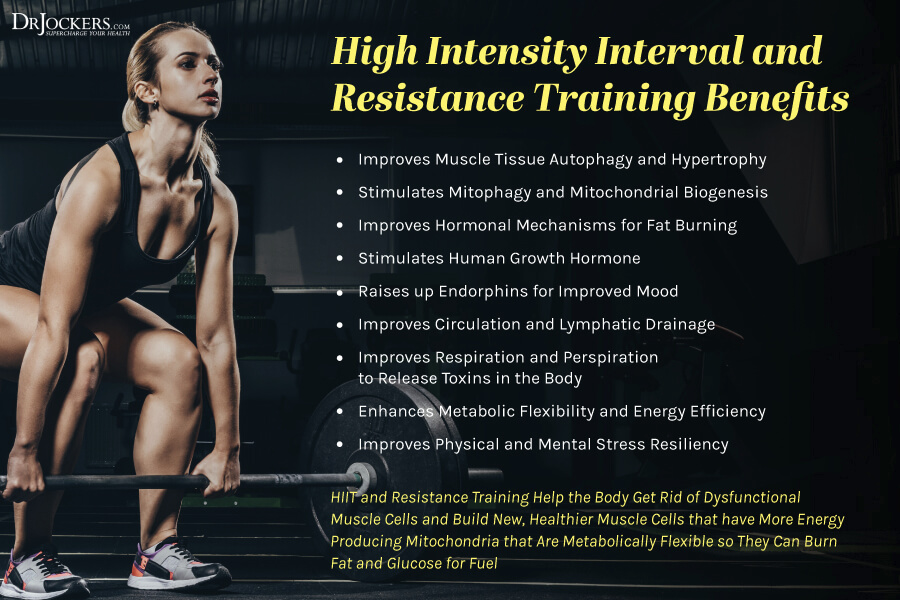
Prioritize Good Sleep for Autophagy
We all know how important sleep is and so it should be no wonder that our sleep cycle and circadian rhythm is intimately tied into autophagy (19). Individuals with circadian rhythm disorders due to poor sleeping habits, insomnia and long-term night shift work have an increased risk of early-onset chronic disease development.
One of the reasons for this is that autophagy is in part regulated by light & dark cycles and deep sleep favors an environment for optimal autophagy mechanisms. You will need to priortize good sleeping habits in order to help your optimize autophagy with your intermittent and extended fasting regimen. If you are struggling with poor sleep, be sure to read this helpful article

Use Heat and Cold Strategically for Autophagy
Short periods of intense heat and cold exposure have also been shown to promote autophagy mechanisms (20). Rapid temperature changes are a major stressor on our body and we have to adapt quickly to get back to balance and homeostasis.
This is one reason why stressed out people often get sick with colds, infections and the flu when the temperature drops outside. Their body was already stressed and immune susceptible and when the weather changed quickly it overwhelmed their body and made it hospitable to environmental pathogens.
Rapid temperature changes can also be used strategically as a hormetic stressor to boost our internal resistance to stress. Autophagy-related genes are required for the thermoresistance and longevity of animals exposed to hormetic heat shock or cold temperatures.
This adaptation pushes autophagy and gives us a much greater ability to adapt to temperature changes and other stressors we encounter. In essence, strategic dosing of hot and cold temperatures makes us stronger and more resilient human beings.
Some ways to take advantage of this are to exercise outside in the heat of the summer or use a steam sauna or what I do personally, an infrared sauna on a regular basis. For cold adaptation, I like to finish my daily shower with 1 minute at the coldest temperature possible.
I pump my arms and legs in order to activate my skeletal muscle when this is going on and it gives a great boost to circulation and feel-good compounds such as serotonin, dopamine and endorphins. For more info on cold showers read this article.
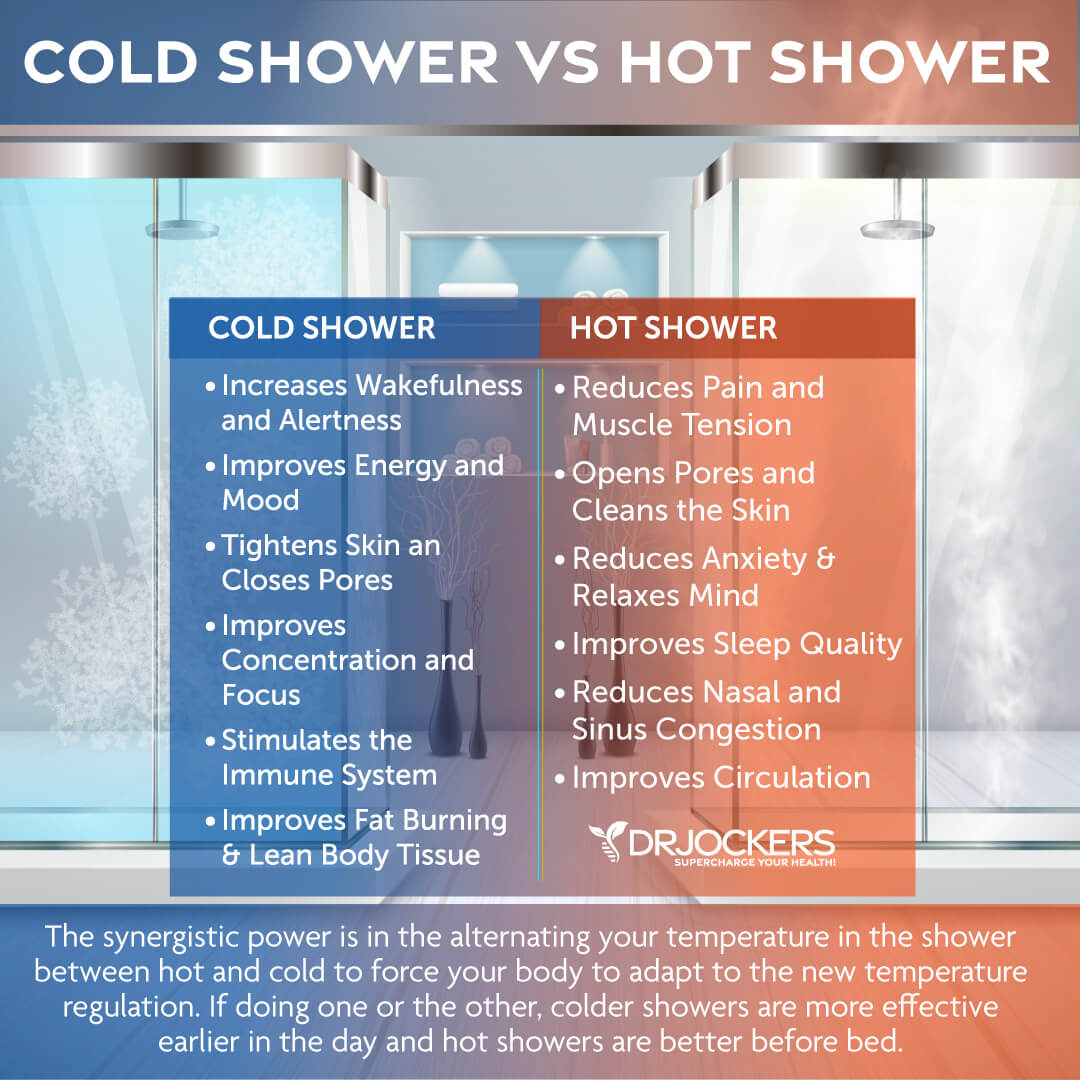
Consume High Quality Protein
Adding protein to your diet (during your eating window, of course), is very important for balancing out the benefits of autophagy with proper building mechanisms so your body is strong and healthy.
Driving up autophagy for a prolonged period of time can cause many issues I discussed already in the section on feasting. Protein is vitally important to the mTOR pathway to build up strong cells. The mTOR building and the AMP-K autophagy pathways need to be in balance for most individuals and applying intermittent fasting along with periods of feasting and good quality protein intake creates this appropriate balance.
In certain cases, such as fast growing tumors, we may want to restrict protein all together for an extended period to stop the mTOR pathway but this is a rare exception. Autophagy naturally rids your body of damaged, old, or excess cells first (21).
To ensure that you maintain muscle mass, it’s important that you eat enough lean protein. Eating protein helps those muscle cells stay healthy. It feeds muscle cells so they’re able to repair any microscopic damage that’s made during exercise. Each time they’re repaired, they get a little bigger. As long as they’re being repaired, your body won’t see them as cells that it needs to get rid of, and will opt for other cells, like fat, instead.
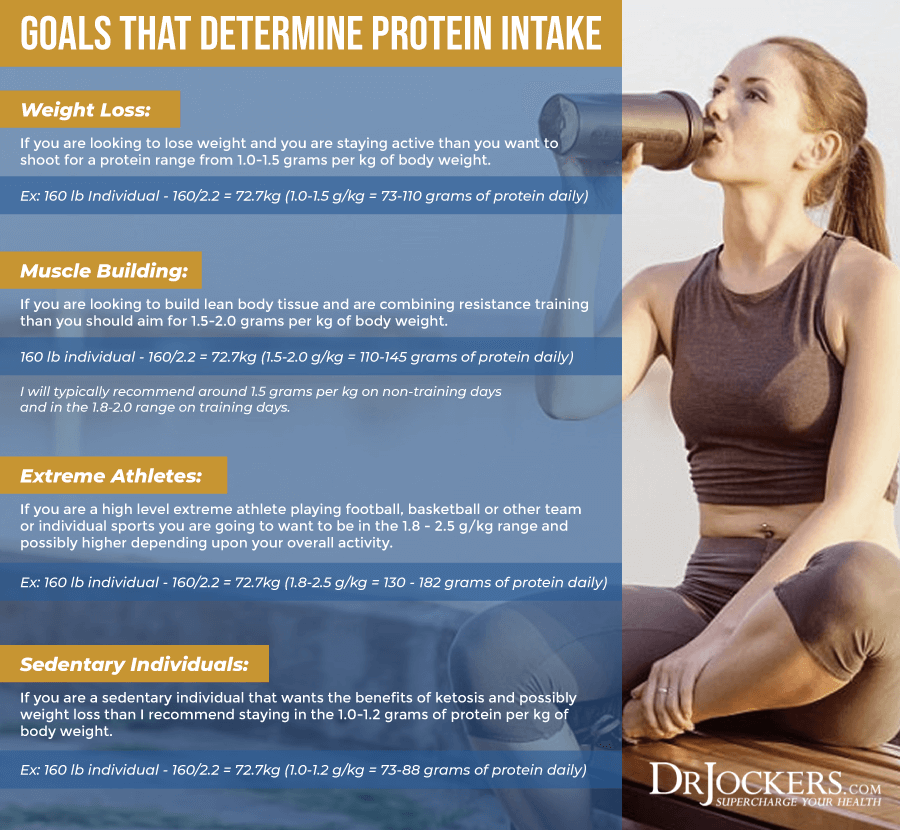
Best Sources of Protein
Use the chart above to determine your daily protein range based around the specific goals you have. Our bodies can handle periods of extended fasting with protein or any calories, but I wouldn’t recommend anymore than one extended fast of 5 days or more per month unless you are under strict medical supervision.
For protein sources, it is best to choose organic, pasture-raised meats, eggs, dairy and wild-caught fish. You can also use plant based protein sources such as nuts, seeds and legumes.
I am also a huge fan of adding a good quality bone broth protein powder into your diet to get more connective tissue amino acids into your body. You can also use a vegan based protein source such as pea, hemp, chia or rice protein to support your protein needs. This vegan protein powder is especially important if you are avoiding or limiting your animal protein sources.

Conclusion
Fasting is a powerful way to stimulate autophagy to help your body cleanse and rejuvenate its cellular structure. In addition to fasting, applying the strategies discussed throughout this article will help you to lose weight and improve your mental clarity and mood.
Whether you’ve only just started intermittent fasting or have been practicing this lifestyle for some time, these 5 tips can enhance your fast as well as improve the quality of your experience.
If you are looking for a more in-depth understanding of intermittent and extended fasting than I encourage you to check out my Fasting Transformation book which goes into the most recent scientific research and strategies for implementing intermittent and extended fasting into your life. It is, by far, the best book on fasting the world has ever seen! It is now, my great honor to present this to you and I am deeply appreciative of your support!
Metabolic Autophagy & Cellular Healing Masterclass
Autophagy is the body’s innate mechanism for deep cellular healing and repair and it helps us reduce the effects of aging, inflammation and cellular damage.
The Nobel Prize in 2016 was awarded to the Japanese researcher Yoshinori Ohsumi for his breakthrough work in helping us understand the process of autophagy and how it works. If you are struggling with your health or desire to optimize your health, activating the appropriate amount of autophagy is a critical component.
This masterclass will give you in-depth video trainings along with image-rich, research-based guides to help you understand the tools and strategies to unlock your body’s dormant healing potential. You will also learn my signature 6-week Metabolic Reset Cycle that will show you how to utilize advanced nutrition strategies for deep cellular healing!
Check out the masterclass here where you will learn my best action steps for optimal healing!
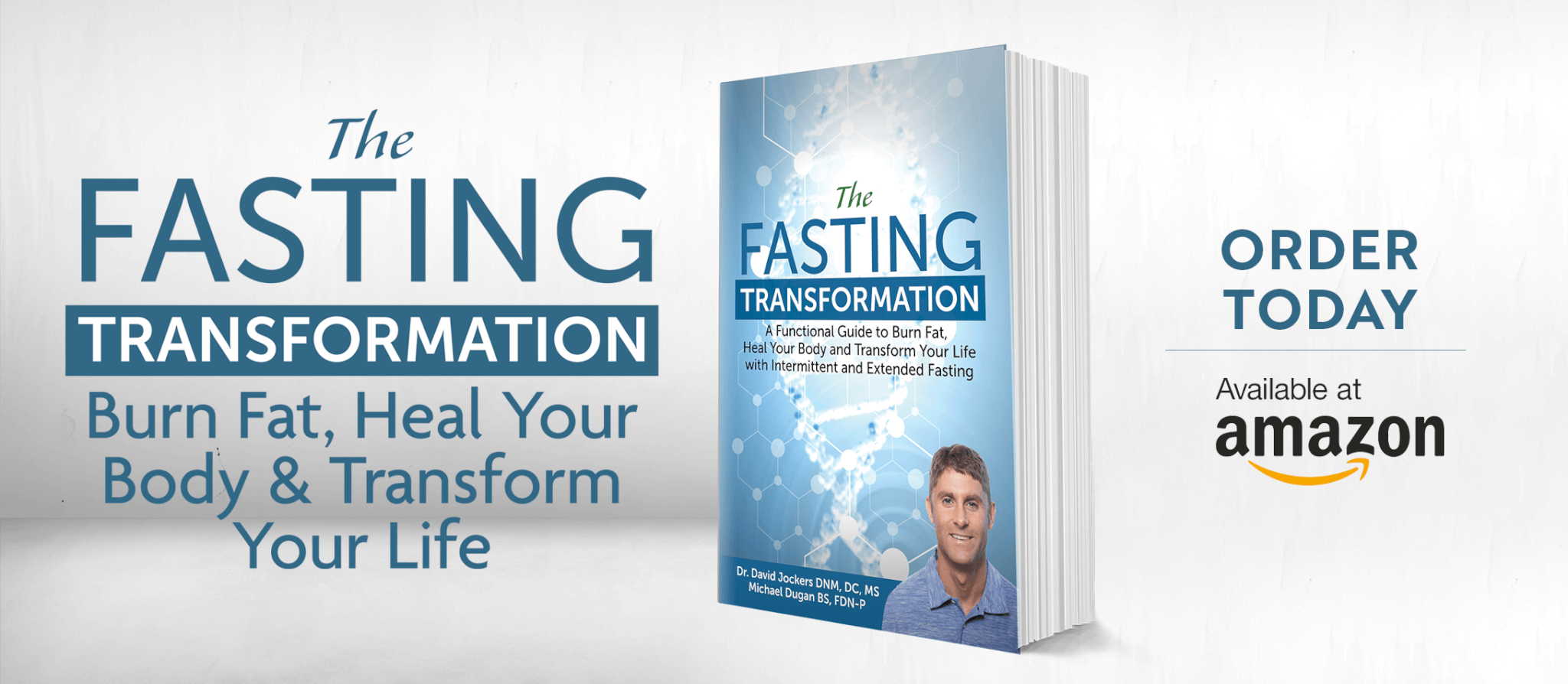

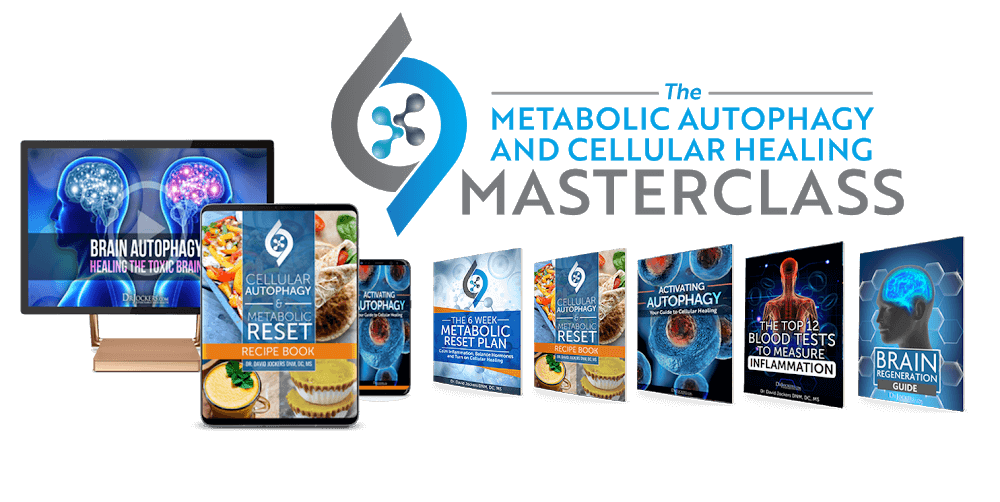



Hello Dr David, I am type 2 diabetes since 9 years ago, when I was 60 years old. I have reduced my weight by 13 kg and I planed 7 kg more to reach my BMI to under 25, I have used intermittend fasting by 23 to 1 h since 5.5 monthes ago, my bloodpressure reduced to 125/75 mmHg and my blood sugar to less than 100 mg/dl (5.4 mmol/lit), Hb H1c to 35%. Now I am very happy approaching my aim, I have a few questions, if possible to answer, appreciated.
1.What is the role or influence of Kakao if I drink during breaking the fasting?, What´s happens to our muscles by stretchig after exercise?, 3. Why my blood sugar goes sometimes up during fasting?, 4. How many eggs do you recommend/week? Thanks a lot.
Hi Kazem, Please join my Fasting Transformation Experience group using this link: https://www.facebook.com/groups/807737992920006/. You will learn the answers to your questions and more as you continue on your health journey.
Why is it that, doctors like Dr Mcdougall, Barnard, Esselstyn, Cyrus Kimbatta (himself is type 1 diabetic) are having extremely great success with carb alone (no fat, no meat) Diet in treating diabetes, heart disease, weight loss, etc.?
They claim that it is fat that causes the above mentioned issues.
Fat coats the edothelial cells snd blocks the entrance of sugar into the cells.
Yet, we also have doctors, like you who promote, the opposite diet such as keto.
It is confusing. People with plant based diets have a long hx of long and healthy lives but i don t know of any centenials in keto camp.
I am not being argumentative just would like clarity, thank you!
Hey Miranda, I haven’t seen good research on fat coating endothelial cells and it doesn’t make any sense from everything we understand from a physiological perspective. In other cultures, they don’t eat like we do here. They often only eat one time per day so they are naturally in ketosis. A well formulated ketogenic diet allows someone to get some of the benefits of fasting without actually fasting. It also very much helps with getting the body better at fasting.
Hey, Miranda!
Dr. McDougall used to be my GP in Hawaii. He made a big name for himself by claiming his diet cures breast cancer. Castle Memorial Hospital adopted his diet and has written many books. After a stroke at 19, he changed his diet to plant based and lost a ton of weight. Yes, there is a lot of contradicting info on diet. We must, therefore rely on intuition and common sense.
Thank you so much for sharing Robyn! Blessings to you!
Pleasure!
Hi Dr. Jockers! I think you’re awesome at explaining many of any chronic issues people experience. I have lots of health issues, and it’s really hard to balance all the competing recommendations that go with these diagnoses. I practice intermittent fasting, and I’ve seen a lot of great results. However when I’ve tried to add in the hiit training, I have had problems with pulling muscle and it taking weeks to recover. (I have pancreatic insufficiency and malabsorption issues even with prescription enzymes, so I’m assuming this might be part of that. However I have also been cachexic in the past so this pattern terrifies me.) Would answers to these questions also be covered in your intermittent fasting program?
Yes I do cover this information in the Fasting program. I would recommend it.
Hi Dr. Jockers, I have read contradicting information on fasting and hashimotos and low thyroid. Is fasting safe for people with these issues? Thanks!
Hey Angela, Over long periods of limited carbs the body can become less sensitive to insulin. It is always best to consult with your health practitioner before implementing fasting into your lifestyle. I would recommend a healing diet outlined in this article for individuals struggling with this condition.
Fasting would be toxic for me and am sure you wouldn’t recommend it for everyone. I’ve lost weight and muscle tone due to adrenal insufficiency and need to gain weight and muscle. However, I do eat a ketoish diet consisting of meats, potatoes, rice, veg, and fruit. No baked stuff. Still, gaining weight is difficult:-(
Hi Robyn, You are right! Fasting is not for everyone because every body has unique needs. I always recommend that working with a health coach will benefit by creating a customized health plan.
Hi Dr Jockers
My friend first told me about autophagy, I recently went on a fast & colon cleanse, lost 10kgs easily, I think I’m at my normal weight for my height now, feels good.
I have a couple of tumours I wanted to starve, the main one has shrunk, so I can easily do a 1 day water fast each week, my aim is to get rid of tumour permanently.
I’m following a Ketogenic diet, but haven’t been too strict, it’s a work in progress 😁
Hey Carol, I’m so happy to hear that you are on a healing journey and feel good! Please join us in our facebook group for encouragement and support!
Great article! So very helpful. Can you give us information on how the body detoxes the dead cells from autophagy and fasting? What can you expect to experience with the detox following a 5 day water fast?
Yes here is a helpful article: https://drjockers.com/water-fast/
As an independent holistic healer.. working with Curofy and Lybrate team and physically and astrally…I know that I have joined the befitting forum..I sense superb vibes.,.l work free of charge.. Blessings of my mentors…the valuable information on autophagy…is very much advantageous and to the best of my knowledge.. Our Respected Dr.Jockers…if the brain takes charge of the body s systems by optimism, confidence and a vegan way of living…life is without any problem s…it’s only perception ..that works…Once again I m grateful to you Dr.Saheb..and wish you all successes in this noble endeavour for the benefit of humanity… Thankful to you ji Once again.
I have real concerns about the advice to do HIIT or any other exercise during an established Fast. Whenever I fast, and I fast often, if I exercise the level of Ketosis decreases and decreases in line with Intensity and length of the exercise. It will take some time a) for the Ketosis to decrease but, dependant on the level of Ketosis at the start of the exercise and b), the Ketosis will return to former levels of Ketosis. I have assumed that as Ketosis goes down so does Autophagy , Stem Cell and HGH productions. It should be noted that it is perfectly possible come out of Ketosis completely as a result of exercise.
You do not mention that Ketosis and therefore Autophagy continue to be unregulated for considerable periods of time provided you do not exercise and follow a reasonable regime of eating. To give some numbers a 7 day Fast can lead to having 10+ days of Ketosis so this may give longer Autophagy up-regulation.
Of course in the above explanation I am assuming that there is a continuous link between Autophagy and Ketosis. I have not addressed the issue of what happens to the generally agreed down-regulation of Autophagy after 7 -14 days of the commencement of the up-regulation of Autophagy. All would be revealed if we could but measure Autophagy.
Hello Ian,
When you exercise on a fast, you increase your blood sugar and reduce ketones, but the adaptation that takes place does increase autophagy. In general, we recommend doing fasted exercise on an intermittent fasting plan but if you are doing an extended fast, you wouldn’t want to do any sort of intense exercise while fasting, particularly if you are normal or underweight already. For those who are overweight, in some circumstances, doing exercise while on an extended fast can help them get further benefits, but that is very individualized.
Dr. David Jockers, my whole life I am correcting my diet. For this moment, I am 74 years old, and since 37 years every morning I take spirulina. I started with 1 gram and today I take 10 gram to 15 gram. Strange enough I was never sick and for my age I have a strong muscle structure. Do you recognize this?
Yes that is great! Spirulina is wonderful. Here is a helpful article: https://drjockers.com/10-benefits-spirulina/
Exceptional article. Most complete and succinct explanation of fasting and autophagy I’ve seen anywhere. Thank you for writing!!!
I take a glass of lemon juice mixed with garlic powder and cayenne pepper first thing in the Will this break my fast?